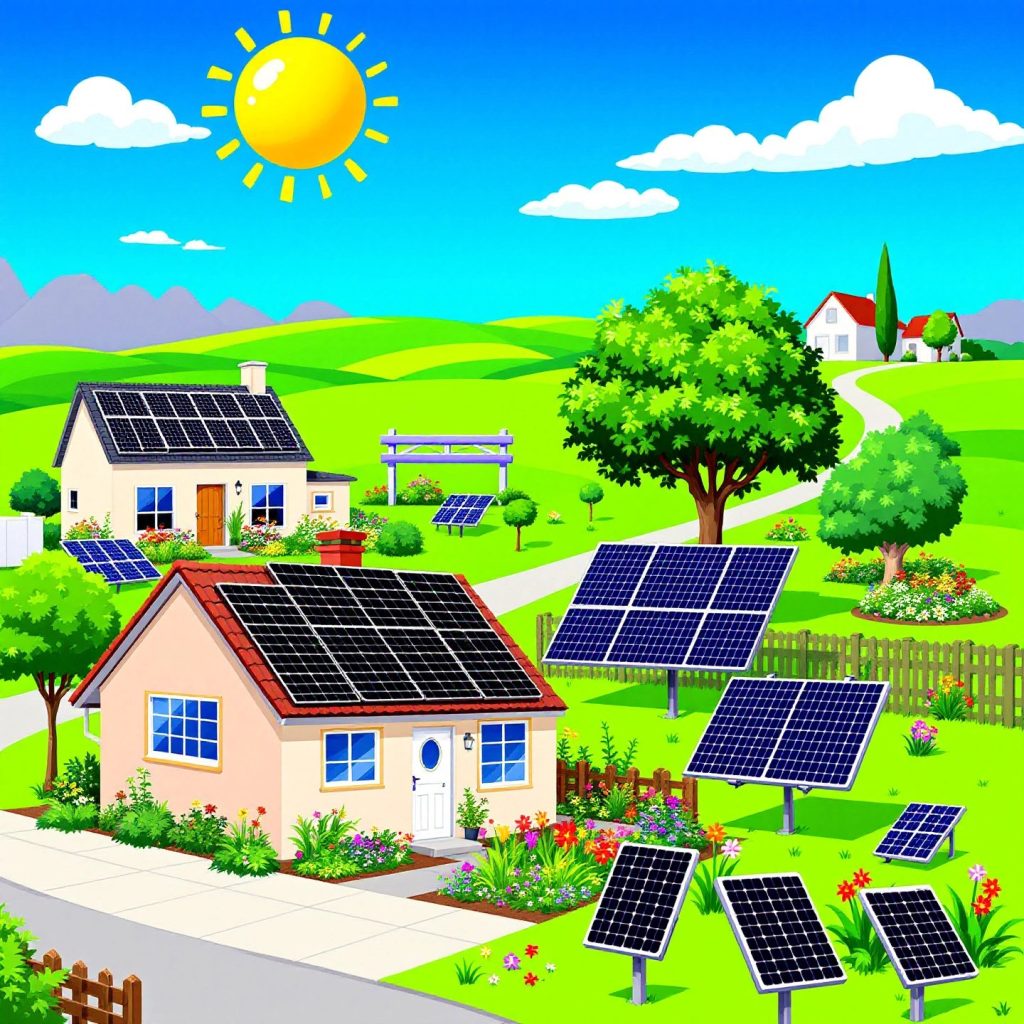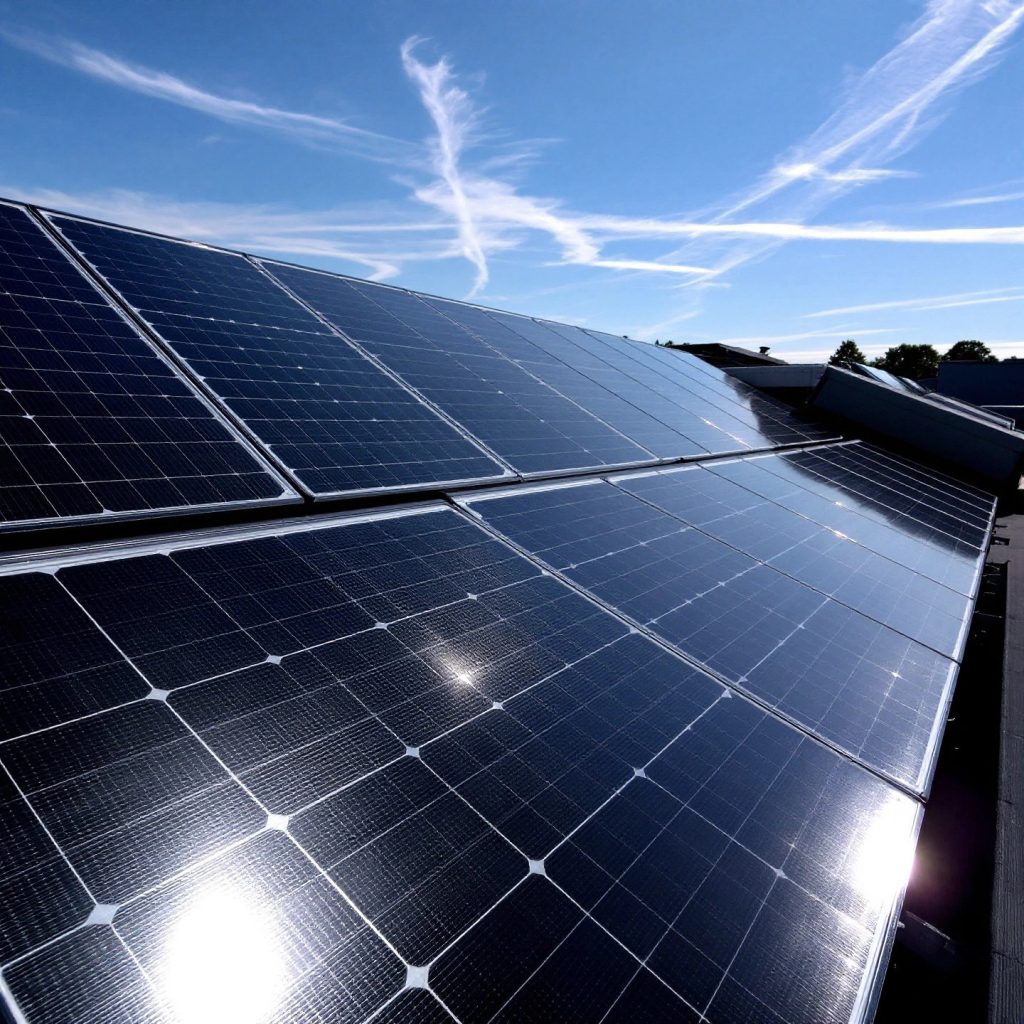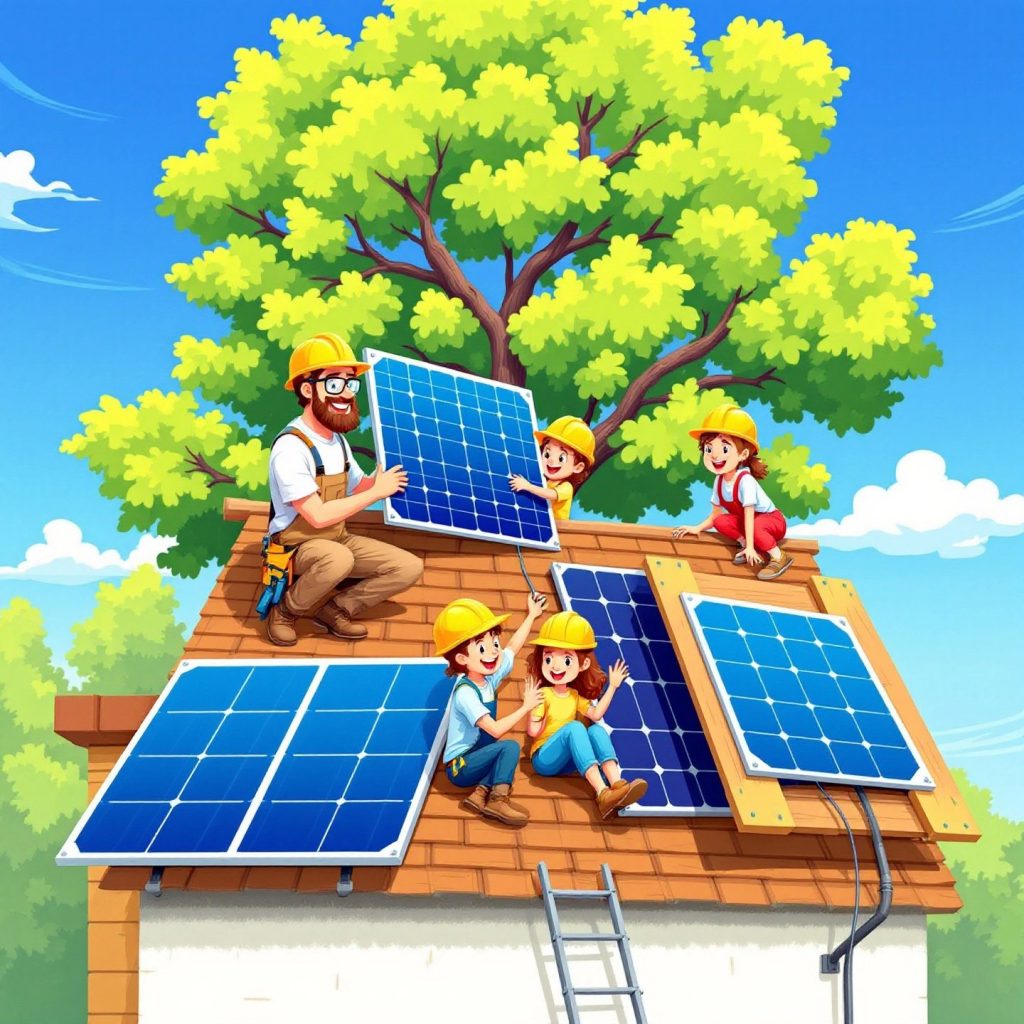Introduction to Small Solar Panels
In today’s eco-conscious world, small solar panels are gaining traction as a sustainable and versatile energy solution. These compact solar systems are particularly appealing to homeowners, campers, and small businesses due to their ability to fit into limited spaces while efficiently converting sunlight into electricity. Whether you’re looking to power your home or take your energy on the road for a camping trip, small solar panels offer a practical alternative to traditional energy sources.
Small solar panels, often ranging from 50W to 200W, are designed to meet the needs of those with space constraints or a desire for portability. Unlike their larger counterparts, these panels are lightweight and can be easily installed on unconventional surfaces like patios, decks, or even backpacks for outdoor adventures. This flexibility makes them an ideal choice for those who want to reduce their carbon footprint without the commitment of a full-scale solar installation.
The applications of small solar panels are vast. For homeowners, they provide an opportunity to power essential devices or supplement existing solar systems, thus reducing reliance on the grid. Campers and outdoor enthusiasts find them invaluable for charging small electronics or powering lights during excursions. Small businesses can utilize them for signage or outdoor seating areas, enhancing both sustainability and brand image.
As we delve deeper into this article, we’ll explore the various benefits, applications, and considerations for integrating small solar panels into your lifestyle. From understanding their core advantages to selecting the right system for your needs, small solar panels offer a gateway to cleaner, more independent energy use. Imagine the possibilities as you harness the power of the sun, whether at home or on your next adventure.
Understanding the Core Benefits of Going Small
When considering solar energy solutions, small solar panels stand out due to their numerous advantages over traditional larger panels. But why exactly are they so beneficial? Let’s break it down into some key aspects that make them an attractive choice for many.
Key Advantages of Small Solar Panels
- Cost-Effective: One of the most significant advantages of small solar panels is their lower upfront cost. They provide an affordable entry point into solar energy for those who might find larger installations financially daunting.
- Portability: Small solar panels are designed with mobility in mind. This makes them perfect for campers, travelers, and anyone needing a portable power source. You can easily pack them up and take them on the go, ensuring you have access to renewable energy wherever you are.
- Easy Installation: Unlike larger solar panels that often require professional installation, small solar panels can be set up with minimal effort. Many come with DIY kits that allow users to install them on patios, RVs, or even temporary setups without needing specialized tools.
- Energy Savings: By supplementing your energy needs with small solar panels, you can significantly reduce your electricity bills. They are ideal for powering small devices and appliances, which can collectively lead to considerable savings over time.
Real-Life Scenarios and Applications
Imagine you’re planning a camping trip. With small solar panels, you can power your essential devices like smartphones, GPS units, and even small lights, enhancing your outdoor experience without relying on traditional power sources. Similarly, homeowners can use these panels to power garden lights or small water features, adding both functionality and aesthetic appeal to their outdoor spaces.
In the context of small businesses, these panels can be utilized to power signage or outdoor seating areas, not only saving on energy costs but also projecting a green image to customers. This dual benefit of cost savings and brand enhancement makes small solar panels a strategic choice for businesses looking to embrace sustainability.
Clearly, the advantages of small solar panels are numerous, offering a versatile and cost-effective solution for various energy needs. As we continue exploring their applications, you’ll discover how these compact systems can seamlessly integrate into different aspects of life, providing both environmental and economic benefits.
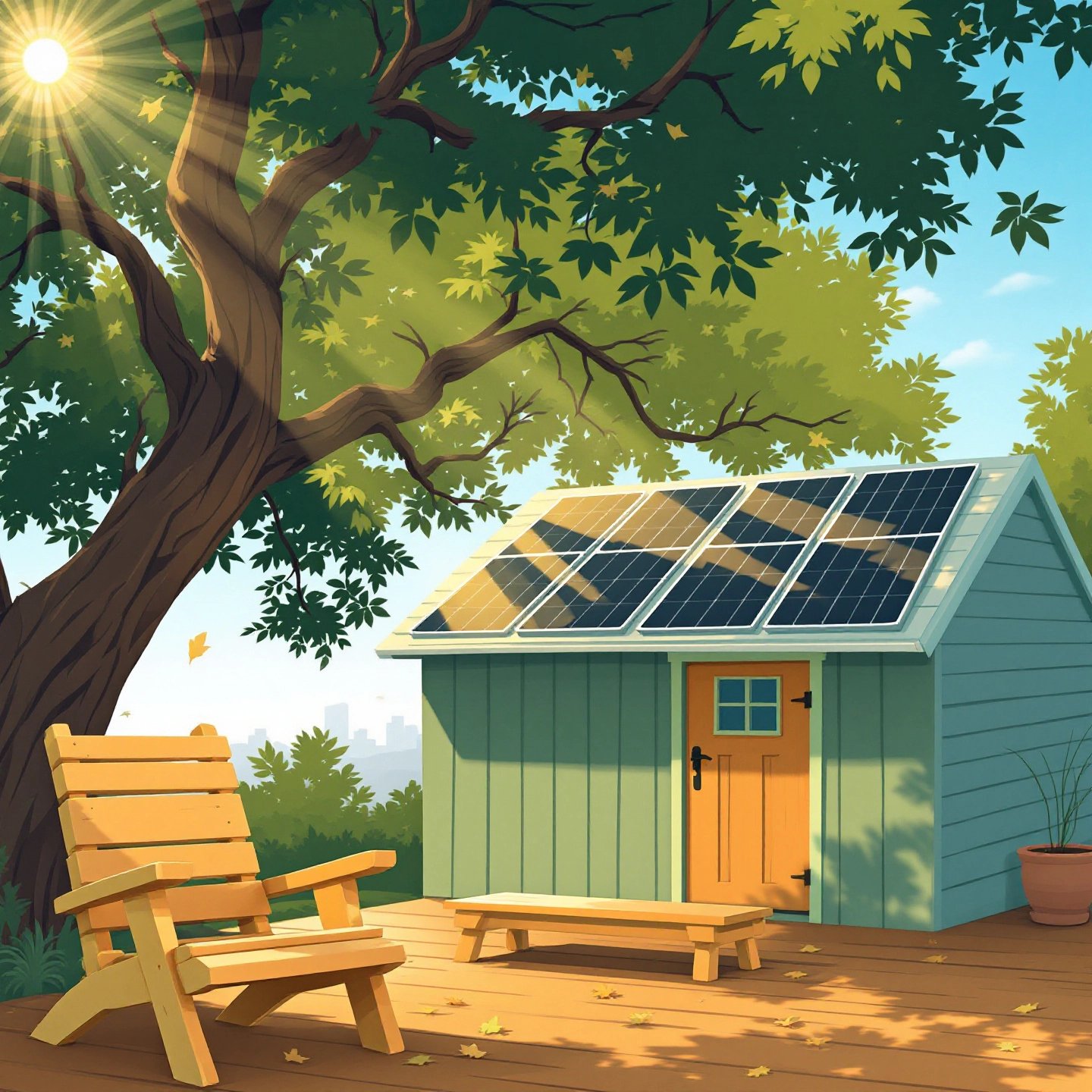
Residential Uses and Outdoor Setup Basics
Imagine harnessing the power of the sun right from your backyard or patio. With small solar panels for home use, this is not only possible but also practical. These compact systems can efficiently power essential home devices or supplement larger solar arrays, offering a flexible solution for modern energy needs.
Small solar panels for home environments are particularly suitable for powering low-energy devices such as garden lights, water pumps, or even small appliances. Their compact size allows for installation in areas where space is limited, such as patios, decks, or shed rooftops. This adaptability makes them an excellent choice for homeowners looking to reduce their carbon footprint without major renovations.
Installation Considerations
Before installing small solar panels, conducting a thorough site assessment is crucial. Here’s a checklist to guide you:
- Roof Condition: Ensure that the surface where you plan to install the panels is sturdy and in good condition to support the panels’ weight.
- Sun Exposure: Evaluate the sun exposure throughout the day. Ideally, the panels should receive maximum sunlight without obstructions from trees or buildings.
- Wiring Needs: Plan the wiring layout to connect the panels to your home’s electrical system. Consider whether you need professional assistance for this step.
When it comes to small solar panel patios, the integration can be both functional and aesthetic. For instance, solar patio covers not only provide shade but also generate electricity, making them a dual-purpose addition to your home. According to EnergySage, solar patio covers are ideal for those who want to maximize their outdoor space while contributing to energy savings.
For those with limited roof space, installing panels on shed rooftops is another viable option. This setup can power tools or lighting within the shed, enhancing its functionality while maintaining energy efficiency.
As you consider integrating small solar panels into your home, remember that these systems offer more than just energy savings. They represent a step towards sustainable living, reducing reliance on fossil fuels and promoting environmental responsibility. Next, we’ll delve into how to choose the best systems for your home and patio needs, ensuring you make informed decisions for your energy projects.
Choosing the Best Systems for Home and Patio Needs
When it comes to outfitting your home or patio with small solar panels, selecting the right system can make all the difference in efficiency and cost-effectiveness. With so many options available, how do you choose the best small solar panels for your needs? Let’s explore some key considerations to help you make an informed decision.
Understanding Wattage and Size
The first step in selecting a solar panel system is understanding the wattage and size best suited for your energy requirements. Typically, small solar panels range from 50W to 200W. The choice depends on your specific energy needs and available installation space. For instance, a 50W panel might suffice for small gadgets or garden lights, whereas a 200W panel could power larger appliances or supplement household energy.
| Wattage | Typical Use Cases |
|---|---|
| 50W | Small electronics, garden lights |
| 100W | Portable power for camping, small appliances |
| 200W | Home energy supplementation, larger appliances |
Choosing the right wattage ensures that your solar panels meet your energy demands without overspending on capacity you don’t need.
Brand and Quality Considerations
Another critical factor is the quality and reliability of the solar panels. Brands can vary significantly in terms of efficiency, durability, and warranty offerings. For instance, panels with a longer warranty period often indicate higher quality and reliability, providing peace of mind and long-term savings. Consider brands like Renogy or Trina, known for their robust performance and customer satisfaction.
For those seeking pre-vetted products, Renewable Energy Nexus offers a range of solar panel kits that simplify the installation process and ensure quality. Their kits include everything needed for a DIY setup, making them a convenient option for beginners. You can explore their offerings here.
Cost-Effectiveness and Efficiency
While upfront costs are a consideration, it’s essential to evaluate the long-term savings and efficiency of the panels. High-efficiency panels might have a higher initial price but can lead to greater savings over time through reduced energy bills. Additionally, consider the installation and maintenance costs, as some systems might offer easier setups or require less upkeep.
Ultimately, the best small solar panels are those that align with your specific energy needs, budget, and installation constraints. By carefully evaluating wattage, brand quality, and cost-effectiveness, you can select a system that not only meets your current demands but also supports your journey toward sustainable living. As we move forward, we’ll explore how these systems can be creatively integrated into garden and lighting projects, enhancing both functionality and aesthetics.
Making the Most of Garden and Lighting Projects
Imagine transforming your garden into a serene oasis with ambient lighting, all while reducing your electricity bills. Small solar panels for outdoor lighting offer a sustainable solution that enhances both functionality and aesthetics in your garden spaces. These panels are perfect for powering various garden features, from pathway lights to decorative fixtures, making them an eco-friendly choice for homeowners.
Using small solar panels for outdoor lighting is not just about saving money; it’s about creating an inviting atmosphere in your outdoor spaces. By harnessing solar energy, you can illuminate your garden without the need for extensive wiring or high electricity costs. This approach is ideal for those looking to add charm and security to their yards while embracing renewable energy.
Design Tips for Solar Panel Placement
For optimal performance, strategic placement of your solar panels is crucial. Here are some tips to ensure your panels are both effective and discreet:
- Maximize Sun Exposure: Place panels in areas that receive the most sunlight throughout the day to ensure efficient energy absorption. Avoid shaded spots caused by trees or structures.
- Blend with the Environment: Consider integrating panels into existing structures like sheds or pergolas. This not only hides them from view but also maximizes their utility.
- Use Adjustable Mounts: Opt for adjustable mounts to angle panels towards the sun, enhancing energy capture and efficiency.
Simple Lighting Solutions
Incorporating solar panels into your garden setup can be straightforward. Here are some simple lighting solutions to consider:
- Pathway Lights: Use small solar panels to power LED pathway lights, ensuring safe and illuminated walkways at night.
- Security Lights: Install solar-powered motion sensor lights to enhance security around your home without increasing your electricity bill.
- Decorative Features: Enhance your garden’s aesthetic with solar-powered decorative lights, such as string lights or lanterns, for a magical evening ambiance.
By implementing these solar solutions, you not only create a beautiful and functional garden but also contribute to a more sustainable lifestyle. As you continue exploring the benefits of small solar panels, consider how they can further enhance your outdoor spaces, paving the way for innovative energy solutions in your home environment.
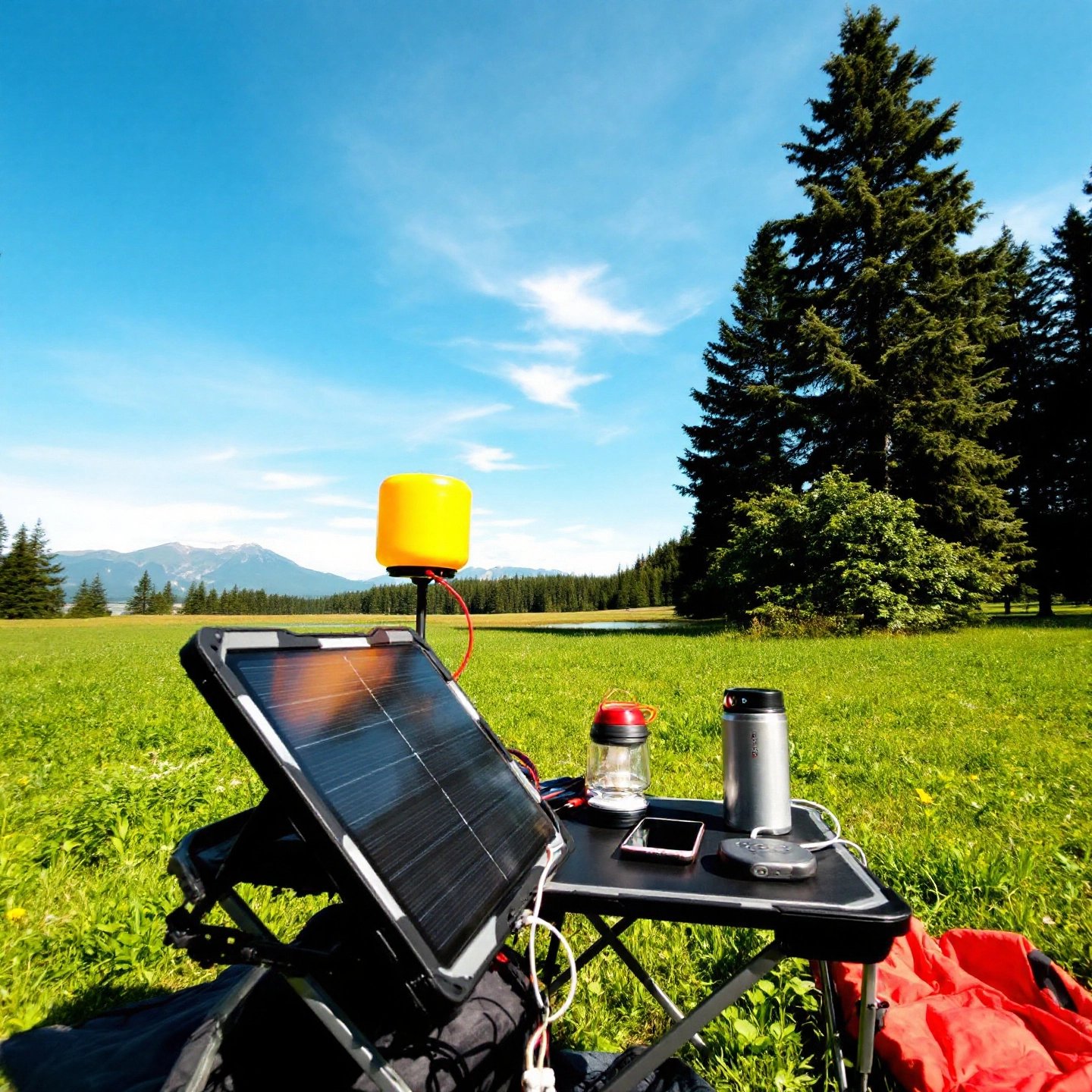
Exploring Portable Gear and Off-Grid Applications
Imagine setting up camp in the wilderness, far from the reach of traditional power sources, yet still enjoying the conveniences of modern technology. This is where small solar panels for camping come into play. Portable small solar panels have become increasingly popular among campers, RV enthusiasts, and outdoor adventurers who seek a reliable power source off the grid.
These compact panels are designed to be lightweight and easy to transport, making them ideal for those who love to explore the great outdoors without sacrificing comfort. Whether you’re charging your smartphone, powering a mini-fridge, or keeping your campsite illuminated, small solar panels offer a practical solution for energy needs in remote locations.
Wattage Requirements for Camping Gear
When planning your camping trip, it’s essential to consider the wattage requirements of your devices. For basic camping needs such as charging phones and powering lights, a 50W to 100W solar panel is typically sufficient. However, if you plan to run high-draw appliances like electric coolers or grills, you might need panels with 200W or more capacity. Here’s a quick guide:
- 50W-100W: Suitable for small devices like smartphones, tablets, and LED lights.
- 100W-200W: Can power larger devices such as laptops, portable fans, and small refrigerators.
- 200W+: Needed for high-power appliances like electric grills or large coolers.
According to VTOMAN, a good rule of thumb is to allocate 50-100 watts of solar capacity per person for casual camping use, ensuring you have enough power for all your essential devices.
Must-Have Accessories for Off-Grid Adventures
To maximize the efficiency and convenience of your solar setup, consider investing in a few essential accessories:
- Power Banks: Store excess energy generated during the day for use at night or during cloudy weather.
- Adapters: Ensure compatibility between your solar panels and various devices.
- Portable Stands: Allow you to angle your panels towards the sun for optimal energy capture.
- Extension Cables: Provide flexibility in panel placement, ensuring they receive maximum sunlight.
These accessories not only enhance the functionality of your solar panels but also ensure you have a reliable power supply throughout your camping trip. With the right setup, you can enjoy the freedom of the outdoors while staying connected and comfortable.
As you pack for your next adventure, consider how small solar panels can transform your camping experience. Their portability and efficiency make them an excellent choice for anyone looking to embrace sustainable energy on the go. Next, we’ll explore how these systems can be integrated into 12V and battery-powered solutions, offering even more versatility for off-grid living.
Insights on 12V and Battery-Powered Solutions
Have you ever thought about how much more independent you could be with a reliable power source that doesn’t rely on the grid? Small 12V solar panels, combined with battery-based systems, offer a practical solution for those looking to power tools, fans, or even have an emergency backup ready at all times. These systems are particularly beneficial for off-grid living, RV setups, and even small cabins where traditional power might not be available.
12V solar panels are designed to produce enough voltage to efficiently charge a 12V battery. This makes them extremely versatile and suitable for various applications, from powering small appliances to supporting outdoor adventures. They are compact and portable, allowing easy installation and mobility, which is essential for those who frequently change locations or need a temporary setup.
Choosing the Right System
When selecting a 12V solar panel system, it’s essential to consider the compatibility of charge controllers, inverters, and battery capacities. Here’s a comparative table to help you understand the options:
| Component | Description | Considerations |
|---|---|---|
| Charge Controller | Regulates the voltage and current coming from the solar panels to the battery. | Ensure it matches the voltage and capacity of your battery to prevent overcharging. |
| Inverter | Converts DC power from the battery into AC power for household appliances. | Choose based on the total wattage of the devices you plan to power. |
| Battery Capacity | Determines how much energy can be stored for use when the sun isn’t shining. | Opt for larger capacities if you need to power multiple devices or for extended periods. |
For those interested in ready-made solutions, Renewable Energy Nexus offers specialized kits that include everything you need for a seamless setup. These kits are ideal for individuals seeking integrated battery storage solutions, especially in off-grid scenarios.
Applications and Benefits
Imagine having a small solar panel with a battery that can power your essential tools during a power outage or keep your RV appliances running smoothly when you’re off the beaten path. These systems not only provide independence from traditional power sources but also contribute to a more sustainable lifestyle by reducing reliance on fossil fuels.
Whether you’re looking to enhance your outdoor adventures or ensure your home is prepared for emergencies, small 12V solar panels with battery setups offer a reliable and eco-friendly solution. As we continue exploring the potential of small solar systems, consider how these innovations can empower your lifestyle, offering both convenience and sustainability.
Next, we’ll delve into how small solar panels can benefit small businesses, providing cost savings and enhancing brand image through sustainable practices.
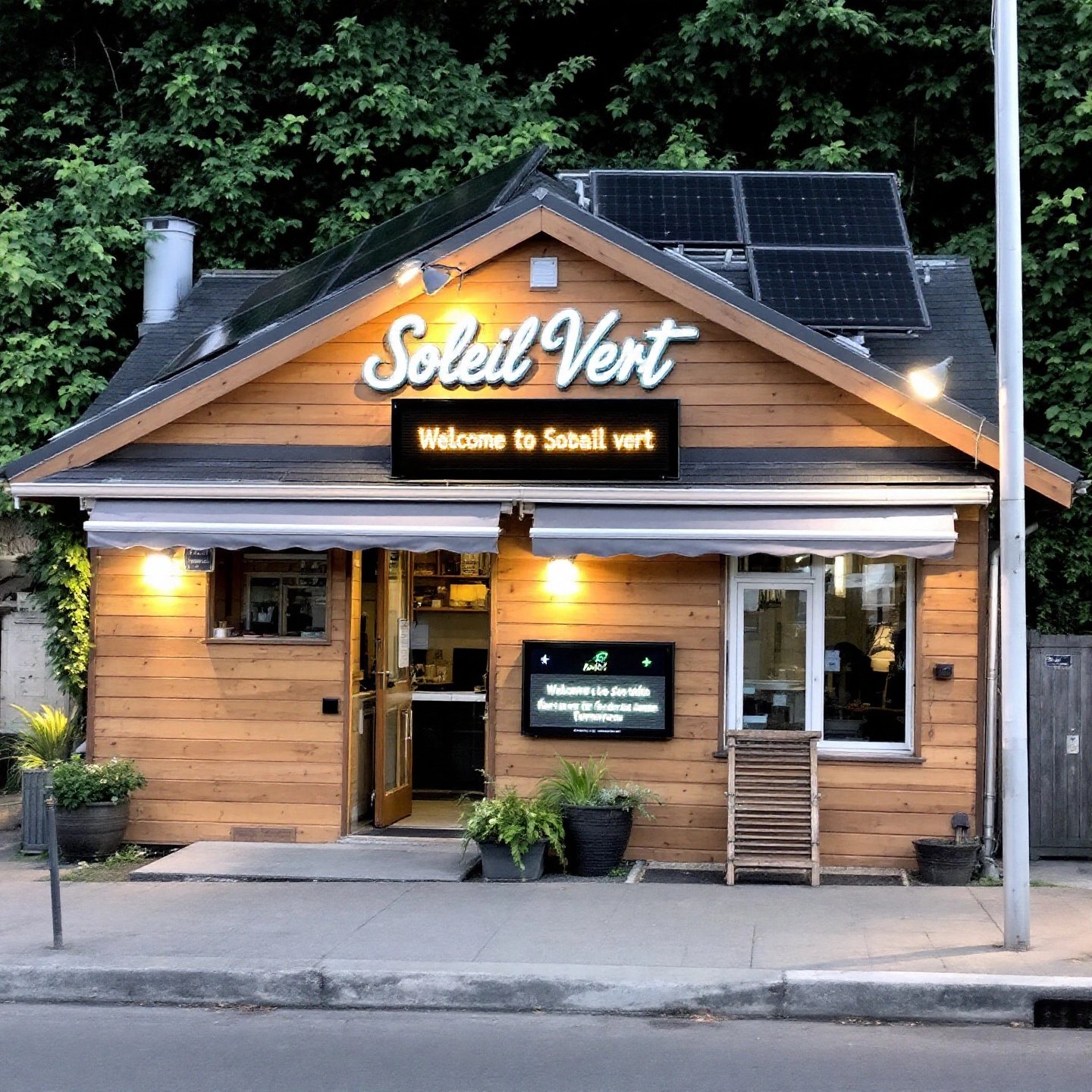
Commercial Perspectives and Business Advantages
Imagine a small business that not only cuts costs but also stands out as an eco-friendly leader in its community. This vision can become a reality with the adoption of solar panels for small business use. By integrating solar power, businesses can reduce electricity expenses, enhance their brand image, and contribute to a sustainable future.
Switching to solar energy offers numerous advantages for small businesses. One of the most compelling benefits is the potential for significant cost savings. By generating their own electricity, businesses can lower their utility bills and protect themselves from fluctuating energy prices. According to Earthwise Energy, businesses can cut their energy costs by up to 75% with solar installations, freeing up resources for other business needs.
Practical Uses of Small Solar Panels in Business
- Window Displays: Solar panels can power vibrant window displays, drawing in customers with energy-efficient lighting.
- Digital Signage: Utilize solar energy to run digital signs and advertisements, reducing the need for traditional power sources.
- Outdoor Seating Areas: Enhance outdoor customer experiences by using solar panels to light and heat seating areas, creating a welcoming atmosphere.
- Partial Office Power: Offset some of the office’s energy use by powering essential equipment with solar, reducing overall electricity consumption.
These applications not only save money but also project a commitment to sustainability, which can enhance a business’s reputation among environmentally conscious consumers.
Considerations for Business Owners
While the benefits are clear, business owners should consider several factors before making the switch to solar. The initial investment can be substantial, but various financing options, such as Power Purchase Agreements (PPAs), can help mitigate upfront costs. These agreements allow businesses to pay for solar installations over time, making the transition more financially feasible.
Moreover, the return on investment (ROI) for solar panels is often realized within three to five years, after which businesses can enjoy decades of reduced energy costs. Additionally, government incentives and tax rebates can further lower the financial burden, making solar adoption an attractive option for small businesses.
Scalability is another crucial consideration. As businesses grow, so too can their solar systems. Starting with a small installation allows for future expansion as energy needs increase, ensuring that the investment continues to provide value over time.
By adopting solar power, small businesses can significantly enhance their operational efficiency and brand image. As we look forward, the potential for solar energy to transform commercial practices continues to grow, offering a path to both economic and environmental sustainability.
Next, we’ll explore the future trends and innovations in small solar technology, providing insights into how these advancements can further benefit businesses and individuals alike.
Future Trends and Innovations in Small Solar Technology
Imagine a world where solar panels are not only more efficient but also seamlessly integrate into our daily lives. This vision is becoming a reality as innovations in solar technology continue to evolve. The future of small solar panels is bright, with advancements promising to enhance their performance, durability, and versatility.
Emerging Technologies Making Waves
One of the most exciting developments in solar technology is the advent of flexible solar panels. These panels are lightweight and can be installed on curved surfaces, expanding their application possibilities. Imagine solar panels that can be incorporated into clothing or even vehicles, providing energy on the go. This flexibility is not just a convenience but a game-changer for portable solar solutions.
Another significant breakthrough is in the realm of thin-film and perovskite solar cells. These materials offer higher efficiency rates and lower production costs, making solar technology more accessible. According to GreenLancer, perovskite solar cells have achieved record-breaking efficiency levels, pushing the boundaries of what solar panels can achieve.
Advancements in Energy Storage
As solar panels become more efficient, the need for advanced energy storage solutions becomes paramount. Innovations in battery technology, such as lithium-ion and flow batteries, are paving the way for more effective solar energy storage. These advancements ensure that solar energy can be stored and used even when the sun isn’t shining, enhancing the reliability of solar power systems.
Battery management systems are also evolving, providing better control and optimization of stored energy. This means users can maximize their solar energy use based on demand, leading to greater efficiency and cost savings.
Key Trends Shaping the Future
- Portability: Flexible and lightweight designs are making solar panels more portable, ideal for outdoor enthusiasts and remote applications.
- Connectivity: Integration with smart technologies and IoT capabilities allows for real-time monitoring and optimization, ensuring maximum efficiency.
- User-Friendly Integration: Simplified designs and installation processes make solar panels more accessible to the average consumer, promoting widespread adoption.
As we look to the future, these innovations in solar technology are set to redefine how we harness and utilize solar energy. The potential for small solar panels to become more efficient and versatile is immense, offering a sustainable energy solution for a wide range of applications. As we continue to embrace these advancements, the role of solar power in our lives is poised to expand, paving the way for a greener, more sustainable future.
Next, we’ll conclude by summarizing the key insights on small solar panels and their potential to transform how we think about energy, encouraging readers to explore sustainable energy solutions for a better tomorrow.
Conclusion
As we conclude our exploration of small solar panels, it’s clear that these compact energy solutions offer significant benefits that align with both economic and environmental goals. From providing cost-effective power for homes and businesses to enabling off-grid adventures, small solar panels are a versatile tool in the sustainable energy toolkit.
Throughout this article, we’ve highlighted the core benefits of small solar panels, such as their affordability, portability, and ease of installation. These features make them an attractive option for homeowners looking to reduce their energy bills, campers seeking reliable power sources, and small businesses aiming to enhance their green credentials. The potential for these panels to supplement larger systems or function independently underscores their practicality and adaptability.
Moreover, the future of small solar panels is bright with innovations in technology and design. As advancements continue, we can expect even more efficient, durable, and user-friendly solar solutions that further integrate into our daily lives. This progress not only promises enhanced performance but also broadens the accessibility of sustainable energy solutions to a wider audience.
Imagine a world where energy independence and environmental responsibility go hand in hand. Small solar panels are paving the way for this vision, offering a stepping stone to a cleaner, more sustainable lifestyle. By choosing to incorporate these systems into your energy strategy, you’re not just saving on costs; you’re contributing to a healthier planet.
If you’re inspired to take the next step towards sustainable energy, consider exploring the offerings from Renewable Energy Nexus . Their range of solar panel products and comprehensive resources can guide you in selecting the right solution for your needs, supporting your journey towards a greener future.
In embracing small solar panels, we embrace a future where energy is not only smart but also sustainable. Let’s harness the power of the sun and make a positive impact, one panel at a time.
Small Solar Panels FAQs
1. What is the smallest size of a solar panel?
The smallest standard solar panel is typically around 52 x 52mm, ideal for compact spaces and portable applications, offering flexibility for various uses.
2. How do small solar panels benefit homeowners?
Small solar panels help homeowners reduce energy bills by powering essential devices and supplementing larger systems, fitting easily on patios and sheds.
3. Can small solar panels be used for camping?
Yes, small solar panels are perfect for camping, providing portable power for devices like phones and lights, enhancing outdoor experiences with renewable energy.
4. What are the key advantages of small solar panels?
Small solar panels are cost-effective, portable, and easy to install, making them ideal for reducing electricity bills and supporting sustainable energy practices.
5. How can businesses benefit from small solar panels?
Businesses can reduce costs and enhance their brand image by using small solar panels for signage, outdoor seating, and partial office power, supporting sustainability.

